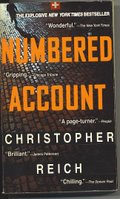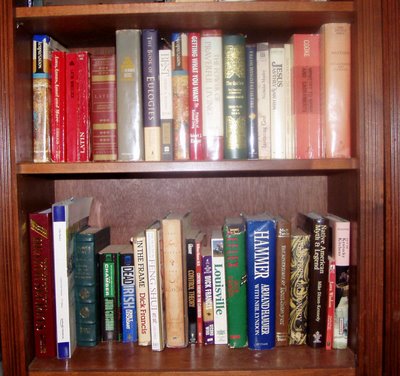When one reaches a certain point in life, even the two thousand plus books in one’s personal library lack the capability to help one escape from the traumas of existence. Then one turns to other means, if those means are available. For me that means turned out to be a box of books left several years ago in my garage by a friend. The books were just a part of the “stuff” she left and had belonged to her ex-boyfriend, who was then incarcerated for embezzlement. I had asked her several times to remove her stuff, which covered a good third of my garage floor; she had taken some of it—the stuff she could sell or otherwise had some pecuniary value. The box of books evidently was not in that category.
Most of the books in the box were paperback novels—thrillers. They could certainly help me escape from the traumas of existence. I found it interesting that the protagonists in three of the books share my name, Nicholas, or a variation of it: Nicholai Hel in Trevanian’s Shibumi; Sir Nicholas Quenton-Harper in Wilber Smith’s The Seventh Scroll
; Nicholas Neumann in Christopher Reich’s Numbered Account
.
I had previously read Shibumi—several times—but I reread it with gusto: Trevanian has a way of creating intriguing characters and impertinent plots that cast disrespectful shadows on the world’s most powerful institutions, from Ma Bell to the international oil cartel. In Shibumi one of those characters, which I have already introduced in a previous blog post, is a colorful Basque revolutionary whose exclamations inevitably refer to the gonads of Christianity most sacred personages. For example: By the four balls of Jesus, Mary and Joseph… Thankfully, Trevanian did not do the same with Muslim saints!
I had not read The Seventh Scroll. It, too, is a good read and great escape literature combining archeology, history, intrigue, and adventure. However, as I read it, I realized that I perhaps needed to read Smith’s previous historical novel, River God, upon which The Seventh Scroll was based.
Interwe aved in the plot of Numbered Account is the story of “the Pasha”, the name the bankers have given to the owner of Account Number 549.617 RR. The owner of Account Number 549.617 RR telephones the bank at precisely 3:00 p.m. twice a week with the same instructions: transfer all deposits in the account (ranging as high as $33,000,000.00 U.S. but never less than $10,000,000.00) to one of seven matrices, each of which lists banks around and the percentage of the funds to be transferred to each bank. Our protagonist, Nicholas Neumann, is flabbergasted by the size of the deposits and transfers.
aved in the plot of Numbered Account is the story of “the Pasha”, the name the bankers have given to the owner of Account Number 549.617 RR. The owner of Account Number 549.617 RR telephones the bank at precisely 3:00 p.m. twice a week with the same instructions: transfer all deposits in the account (ranging as high as $33,000,000.00 U.S. but never less than $10,000,000.00) to one of seven matrices, each of which lists banks around and the percentage of the funds to be transferred to each bank. Our protagonist, Nicholas Neumann, is flabbergasted by the size of the deposits and transfers.
I’m not be divulging too much of the plot by informing you that the owner of Account Number 549.617 RR is involved in the international illicit drug trade. As with the character, Nicholas Neumann, I, too, was flabbergasted by the dollars passing through Account Number 549.617 RR! I was so astounded that I decided to spend a bit of time researching the reality of these amounts. What I discovered was that the illegal drug industry is making hundreds of billions of dollars selling prohibited opiates, cocaine, amphetamines, and marijuana, as well as other drugs. Astounding!
Or, perhaps not so astounding. It has only been since I returned to
Those addicted to drugs certainly do not benefit. I saw what addiction to opiates and amphetamines did to the life of “Candy.” She would do anything, from lying and stealing to prostituting, to obtain drugs. “Larry” I understand sold drugs: one of his clients was a retired Federal judge—or so he claimed. “Stephanie,” unknown to me when I allowed her and her baby to stay at my house, had been convicted of using and selling drugs. From my observations, none of these people or the drug addicts they told me about benefited from drugs.
So who does benefit? Obviously it is those greedy and insatiable characters such as the fictional owner of Account Number 549.617 RR. But I also wonder about world governments. The
With so much money involved, it seems to me that maintaining the criminalization of illicit drug use is very beneficial to some. More on this point in a later blog.


Rand study showed that we can reduce illicit drug usage in this country a specified amount through treatment programs at about 10% of the cost of reducing drug usage by that same amount through criminalization and law enforcement.
ReplyDeleteThere's just something in the American psyche that demands that drug users be punished instead of treated and rehabilitated. We think they're stupid and ignorant for getting mixed up with those drugs in the first place. And you know what? We're right? But look at the messages we send to our children every single day with cigarettes, alcohol, and an endless stream of drug ads on television and in magazines. Drug culture? You bet we have a drug culture! "Ask your doctor about Noassitol!"
It is time to legalize all drugs. Criminalization of drugs is our modern day Prohibition, and it is creating our modern day Al Capones.
ReplyDeleteI remember a discussion with a friend (now deceased,) years ago- she had seen a documentary on a country (don't remember which) where some people did drugs as they seemingly had nothing else...
ReplyDeleteShe asked me if that wasn't merciful, as it would numb the pain of hunger & need.
I disagreed. I said the drugs, which were aplenty, were killing these people. Thirty year-olds looked like they were ninety. The drug was lying to them- & instead of whatever-it-was they were taking, why couldn't food be grown instead?
I feel the same way about tobacco, & I smoked for years. It's an unnecessary entity- expensive in more ways than one. And no offense to those who grow it- but can't they grow something useful instead? Like food? Or cotton?
Your reviews were good Nick- I haven't read much fictional intrigue but you made it sound interesting. Have you written these stories up on Amazon also?
loved shibumi
ReplyDeleteAnother great protagonist who shares your name was Dashiell Hammett’s Nick Charles (which is short for his Greek moniker, "Charalambides") who solved a bunch of crimes with his wife, Nora. “The Thin Man” is one of my all time favorite books.
ReplyDeleteWonderful thoughtful post as always Nick. I have spent many a time thinking and researching whether or not de criminalisation would be beneficial. I keep coming up with the same answers....my head says yes....my heart says no.
ReplyDeleteYou can't use booze and cigarettes in this equation...if they were discovered today, both would be banned. Sadly, there is no evidence de criminalisation would work, until then, i will reserve my judgement.
Banking secrecy does not protect criminal or illegal activity. Swiss banking secrecy is in no way absolute. It is lifted immediately if a Swiss judge or prosecutor issues a lifting order in the course of a domestic or international criminal investigation. This includes foreign criminal investigations of terrorist financing, money laundering, insider trading, and tax fraud.
ReplyDeleteThe book Numbered Account is a real page turner! Nick Neuman is haunted by the death of his father 17 years ago. He gets new information that implicates his father's employer, the United Swiss Bank, and Nick will stop at nothing to uncover what happened to his father, including getting a job at the United Swiss Bank.
ReplyDeletei like the pic of ur books how about some of all of your libray i bet its neat
ReplyDeleteShibumi is one of my favorite books. I had forgotten the “By the four balls of Jesus, Mary and Joseph” curse! I have not read the other two books, but believe that I shall (based on your recommendations, Saint).
ReplyDeleteAs for drug profits, of course the plutocrats have a vested interested in keeping the criminalization laws on drugs. They make such humongous profits! Do you realize that Afghanistan’s opium harvest this year has reached the highest levels ever recorded, showing an increase of almost 50 percent from last year? That accounts for 92% of total world supply of opium and UNODC puts the export value of this year's crop at $2.8 billion. No wonder Bush and the greedy tycoons who run him wanted control of Afghanistan!
Hi, Nick. After reading about the kind of books you like, I think you would enjoy The Codex, and Tyrannosaur Canyon by Douglas Preston. They are both archaeological thrillers. I read them and they were excelllent, really transportive and good for what ails you. Great adventures, both. I know this author has written several other books as well. I don't know if the older ones would be in bookstores, but I'll bet the library would have a title or two.
ReplyDeleteI had not read the story of Candy before. I'm sorry. I know that level of betrayal is painful. You're a good person, Nick. I appreciate you.
Oh, I forgot... it would be better (but not neccessary) to read The Codex first. They have characters in common and the events in The Codex take place first.
ReplyDeleteHi Nick ~ Strange to find so manymen named Nicholas in a batch of books.
ReplyDeleteI have a grandson Nicholas, who gets
called Nick mostly. I missed your Monday jokes, as you say, not too many
in the mail this week. Thanks for stopping by, and finding a joke or two. Take care, Merle.
Hi Nick ~ Strange to find so manymen named Nicholas in a batch of books.
ReplyDeleteI have a grandson Nicholas, who gets
called Nick mostly. I missed your Monday jokes, as you say, not too many
in the mail this week. Thanks for stopping by, and finding a joke or two. Take care, Merle.